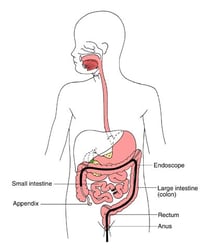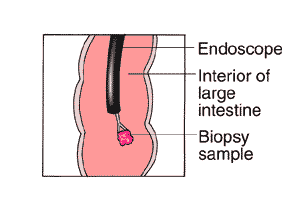Ulcerative Colitis is an inflammation of the lining of the large intestine (colon). This begins in the rectum and can be found continuously involving areas of the colon up to the entire colon.
The inflammation causes diarrhea and urgency of needing a stool as the cells on the surface of the lining of the colon lose their ability to do their job (absorbing water and holding waste). As they die off and are injured, open sores occur which cause ulcers to form. This causes mucus and blood in the stools.
Each case is different, but the most common symptoms include:
- Abdominal pain
- Bloody diarrhea
- Urgency of needing to stool
- Fatigue
- Weight loss
- Loss of appetite, nausea and/or vomiting
- Rectal bleeding
- Loss of body fluids and nutrients
- Anemia caused by severe bleeding
The symptoms of Ulcerative Colitis may be similar to other IBDs, like Crohn’s disease. Your child will need testing to be certain of their diagnosis.
Ulcerative Colitis Testing
Our team will work with your family to make sure your child has the correct diagnosis. This helps us form the best care plan for them.
Common tests to diagnose Ulcerative Colitis include:
- Blood tests: To check for anemia and iron deficiency from blood loss and signs of inflammation
- Stool tests: Checks for inflammation, blood loss and infections
- Endoscopy: The doctor uses a small, flexible tube with a light and a camera at the end called an endoscope. Once your child is given anesthesia and comfortably asleep, the scope goes into the mouth to see the inside of the digestive tract from the upper end. They can also take tissue samples, called a pinch biopsy, for testing to determine what type of inflammation is happening.
- MRI Enterography (MRE): Contrast is given to show the small bowel to determine if there is inflammation in areas that cannot be seen by the traditional endoscopic approaches. This is done without radiation, and an also show the structure of the liver as well as whether there is inflammation around the rectum in patients presenting with abscesses in those areas.
- Colonoscopy: Like an upper endoscopy, a think, flexible tube with a camera is used to look at the inside of your child's colon and last part of the small bowel. The doctor can take a pinch biopsy to look for signs of inflammation.






